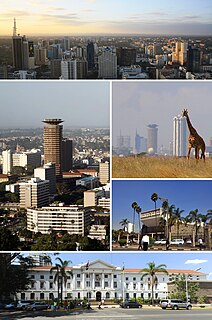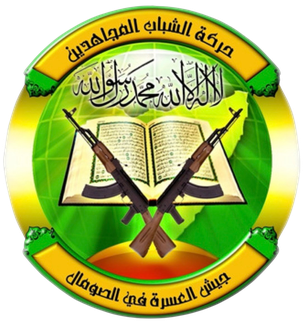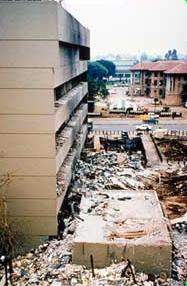| |||||
| Decades: | |||||
|---|---|---|---|---|---|
| See also: | |||||
| |||||
| Decades: | |||||
|---|---|---|---|---|---|
| See also: | |||||

Nairobi is the capital and the largest city of Kenya. The name comes from the Maasai phrase Enkare Nairobi, which translates to "cool water", a reference to the Nairobi River which flows through the city. The city proper had a population of 4,397,073 in the 2019 census, while the metropolitan area has a population of 9,354,580. The city is popularly referred to as the Green City in the Sun.

The 2002 Mombasa attacks was a two-pronged terrorist attack on 28 November 2002 in Mombasa, Kenya against an Israeli-owned hotel and a plane belonging to Arkia Airlines. An all-terrain vehicle crashed through a barrier outside the Paradise Hotel and blew up, killing 13 and injuring 80. At the same time, attackers fired two surface-to-air missiles at an Israeli charter plane. The Paradise Hotel was the only Israeli-owned hotel in the Mombasa area. The attacks were believed to be orchestrated by al-Qaeda operatives in Somalia in an attempt to disrupt the Israeli tourist industry on the African continent. Much speculation has occurred as to who the perpetrators are, but no complete list of suspects has been defined. The attack was the second al-Qaeda terrorist operation in Kenya, following the bombing of the U.S. embassy in Nairobi in 1998. Following the attack, the UN Security Council and other nations condemned the bombing.

Samantha Louise Lewthwaite, also known as Sherafiyah Lewthwaite or the White Widow, is a British woman who is one of the Western world's most wanted terrorism suspects. Lewthwaite, the widow of 7/7 London terrorist bomber Germaine Lindsay, is accused of causing the deaths of more than 400 people. She is a fugitive from justice in Kenya, where she was wanted on charges of possession of explosives and conspiracy to commit a felony and is the subject of an Interpol Red Notice requesting her arrest with a view to extradition.

The African Union Mission in Somalia (AMISOM) is an active, regional peacekeeping mission operated by the African Union with the approval of the United Nations Security Council. It is mandated to support transitional governmental structures, implement a national security plan, train the Somali security forces, and to assist in creating a secure environment for the delivery of humanitarian aid. As part of its duties, AMISOM also supports the Federal Government of Somalia's forces in their battle against Al-Shabaab militants.

Eastleigh is a neighbourhood in Nairobi, Kenya. It is located east of the central business district. It is known for its business prowess, as well as "its poor infrastructure.

Harakat al-Shabaab al-Mujahideen, more commonly known as al-Shabaab, is a terrorist, jihadist fundamentalist group based in East Africa. In 2012, it pledged allegiance to the militant Islamist organization Al-Qaeda. In February 2012, some of the group's leaders quarreled with Al-Qaeda over the union, and quickly lost ground. Al-Shabaab's troop strength was estimated at 7,000 to 9,000 militants in 2014. As of 2015, the group has retreated from the major cities; however, al-Shabaab still controls large parts of the rural areas.

The 1998 United States embassy bombings were attacks that occurred on August 7, 1998. More than 200 people were killed in nearly simultaneous truck bomb explosions in two East African cities, one at the United States Embassy in Dar es Salaam, Tanzania, the other at the United States Embassy in Nairobi, Kenya.

There is a high rate of crime in all regions of Kenya, particularly in Nairobi, Mombasa, Kisumu, and coastal beach resorts. There are regular reports of attacks against tourists by groups of armed assailants. However, the most common crime in Kenya is carjacking so the criminal can commit an armed robbery. "Snatch and run" crimes are becoming more common on city streets.

Operation Linda Nchi was an operation where the Kenya Defence Forces entered southern Somalia beginning in 2011. The Kenyan government declared the operation completed in March 2012, but its forces joined AMISOM in Somalia and are not expected to leave before 2020.
Since late 2011, Kenya has seen an upsurge in violent terrorist attacks. Kenyan government officials asserted that many of the murders and blasts were carried out by Al-Shabaab in retaliation for Operation Linda Nchi, a coordinated military mission between the Somalian military and Kenyan military that began in October 2011, when troops from Kenya crossed the border into the conflict zones of southern Somalia. According to Kenyan security experts, the bulk of the attacks were increasingly carried out by radicalized Kenyan youth who were hired for the purpose. Kenya security officials also indicated that they were part of death squads, which carried out many of the killings under the orders of a government security council. By mid-2014, the cumulative attacks began affecting Kenya's tourism industry, as Western nations issued travel warnings to their citizens.
Aboud Rogo Mohammed was a Kenyan Muslim cleric. He was alleged to have been an Islamist extremist and was accused of arranging funding for the al-Shabaab militia in Somalia. He was shot dead in Kenya, and his death triggered protests and violence by hundreds of protestors. Rogo is the fifth alleged Islamic radical killed in Kenya in 2012. David Ochami, a Kenyan journalist, stated that Rogo had the oratory prowess of Hezbollah leader Hassan Nasrallah and the logic of Egyptian ideologue Yusuf al Qaradawi.
Kenya has been the scene of various attacks attributed to terrorist elements. In 1980, the Jewish-owned Norfolk hotel was attacked by the Palestine Liberation Organization (PLO). In 1998, the US embassy in Nairobi was bombed, as was the Israeli-owned Paradise hotel in 2002. In 2013, the militant group Al-Shabaab killed 67 people at Nairobi's Westgate Shopping Mall. There have been numerous other lesser attacks.

On Saturday, 21 September 2013, four masked gunmen attacked the Westgate shopping mall, an upscale mall in Nairobi, Kenya. There are conflicting reports about the number killed in the attack, since part of the mall collapsed due to a fire that started during the siege. The attack resulted in 71 total deaths, including 62 civilians, five Kenyan soldiers, and four attackers. Approximately 200 people were wounded in the mass shooting.
On 4 May 2014, two improvised explosive devices exploded on buses in Nairobi, Kenya, killing three people and injuring sixty-two. Both of the bombs exploded northeast of Nairobi on the Thika Road, an eight-lane controlled-access highway, and detonated 1 kilometre (0.62 mi) apart. Twenty of the wounded were in critical condition after the blast.
On May 16, 2014, two improvised explosive devices were detonated simultaneously in the Gikomba market in Nairobi, Kenya, killing at least 12 people and injuring 70. The first blast came from a minibus and the second from within the market. Two people were reportedly arrested at the site of the explosions. Shortly after the attacks, hundreds of people swarmed onto the crime scene despite police efforts to stop them.

On 2 April 2015, gunmen stormed the Garissa University College in Garissa, Kenya, killing 148 people, and injuring 79 or more. The militant group and Al-Qaeda offshoot, Al-Shabaab, which the gunmen claimed to be from, took responsibility for the attack. The gunmen took over 700 students hostage, freeing Muslims and killing those who identified as Christians. The siege ended the same day, when all four of the attackers were killed. Five men were later arrested in connection with the attack, and a bounty was placed for the arrest of a suspected organizer.
The 2019 DusitD2 complex attack was a terrorist attack that occurred from 15 to 16 January 2019 in the Westlands area of Nairobi, Kenya, which left more than 20 people dead.
The Latema road blast was a minor terror incident that occurred on 26 January 2019 on Latema road in Nairobi CBD. The attack occurred after luggage containing an improvised explosive device detonated while it was being carried on a mkokoteni cart, injuring two people.

On 6 December 2019, at least 11 people, including seven police officers, were shot dead on or outside a bus in Kenya. The Medina Bus Company vehicle and its passengers were attacked on a road in a rural area between Wajir and Mandera in northeastern Kenya. Al-Shabaab claimed responsibility for the attack.